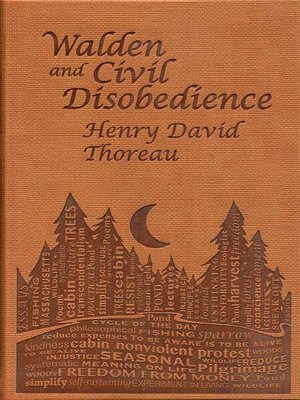
Sign up to save your library
With an OverDrive account, you can save your favorite libraries for at-a-glance information about availability. Find out more about OverDrive accounts.
Find this title in Libby, the library reading app by OverDrive.



Search for a digital library with this title
Title found at these libraries:
| Library Name | Distance |
|---|---|
| Loading... |
"If a plant cannot live according to its nature, it dies; and so a man." —Henry David Thoreau, Civil Disobedience
The oft-quoted transcendentalist Henry David Thoreau is best known for two works: Walden and Civil Disobedience. Walden, first published in 1854, documents the time Thoreau spent living with nature in a hand-built cabin in the woods near Walden Pond in Massachusetts. A minor work in its own time, Walden burgeoned in popularity during the counterculture movement of the 1960s. Civil Disobedience is thought to have originated after Thoreau spent a night in jail for refusing to pay taxes to a government with whose policies he did not agree. Assigning greater importance to the conscience of the individual than the governing law, Civil Disobedience is an internationally admired work that is known to have influenced writer Leo Tolstoy and political activist Mahatma Gandhi, and many members of the American Civil Rights movement.
The oft-quoted transcendentalist Henry David Thoreau is best known for two works: Walden and Civil Disobedience. Walden, first published in 1854, documents the time Thoreau spent living with nature in a hand-built cabin in the woods near Walden Pond in Massachusetts. A minor work in its own time, Walden burgeoned in popularity during the counterculture movement of the 1960s. Civil Disobedience is thought to have originated after Thoreau spent a night in jail for refusing to pay taxes to a government with whose policies he did not agree. Assigning greater importance to the conscience of the individual than the governing law, Civil Disobedience is an internationally admired work that is known to have influenced writer Leo Tolstoy and political activist Mahatma Gandhi, and many members of the American Civil Rights movement.







